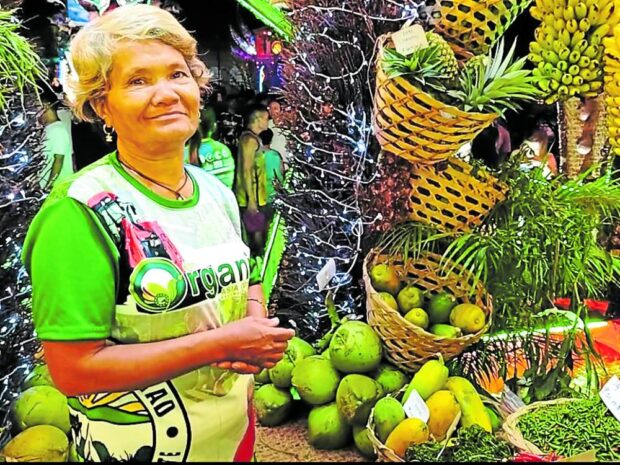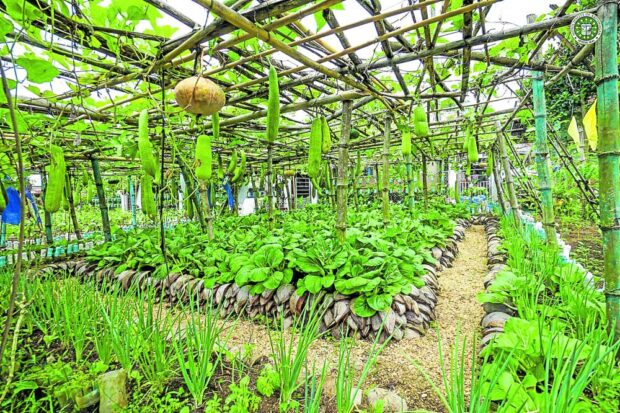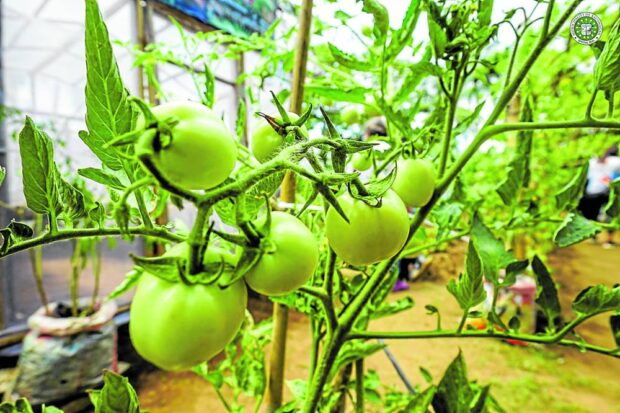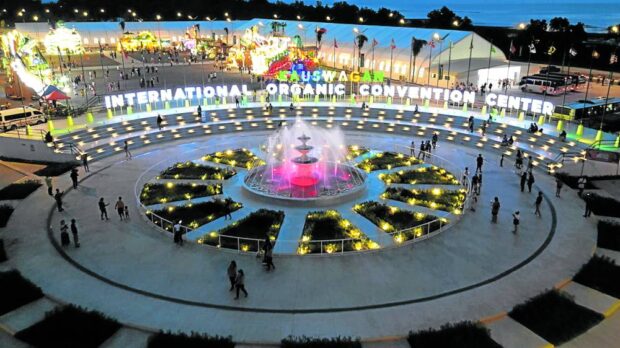‘From Arms to Farms’ gives ex-rebels another shot at life

HEALTHY GREENS | A vendor tends to a booth full of fruits and vegetables at a trade fair held during the 6th Organic Asia Congress in Kauswagan, Lanao del Norte, last month. Kauswagan has slowly risen from its conflict-ridden past, thanks to organic agriculture that has been adopted even by schools that maintain vegetable gardens. (Photo courtesy of the Kauswagan Municipal Government)
KAUSWAGAN, Lanao del Norte, Philippines — At a recent visit by local and international sustainable agriculture experts here, organic farmer Aga Dimakuta shows off his verdant fields with diversified crops in Barangay Cayontor.
Dimakuta presented to the visitors a simple machine he fabricated that resembles a mortar weapon, fitted with a water hose.
“But instead of bombarding [mortar shells], this lets off water and sprinkles it wide,” Dimakuta jokingly explained to his visitors.
From what used to be idle lands, Dimakuta says Cayontor is now a thriving farming community, thanks to the local government’s “From Arms to Farms” program.
The program, according to municipal planning and development coordinator Dione Fuentes, is for former Moro rebels and war-affected families, aiming to help them transition into productive civilian lives, and contribute to increasing local food production.
Article continues after this advertisementOf Kauswagan’s 8,111-hectare land area, about 7,800 ha is classified as agricultural.
Article continues after this advertisementThe program was set amid the town’s strong push to rise from the ashes of the all-out war between government troops and Moro rebels in 2000, 2003 and 2008 which reopened old wounds from the violence that broke out in the early 1970s. The deep scars from the conflict left the town wallowing in poverty.
When former pilot and businessman Rommel Arnado assumed office as mayor in 2010, he focused on restoring the agriculture-dependent local economy which was then highly reliant on the fortunes of coconut farming.

(Photo courtesy of the Kauswagan Municipal Government)
Local gov’t support
Arnado said that early on, he realized that without sufficient food on the table of every household and without a dependable income stream, it would be impossible to talk about and build peace.
He said he chose to underpin this dream of progress and a break from decadeslong conflict with organic farming because of its promise of sustaining the bounty of the soil and the natural resource base, in general, while also producing safe and healthy food. In addition, the low cost of inputs makes it attractive for cash-strapped farmers.
To indicate the local government’s strong push for organic agriculture, the municipal council passed an ordinance declaring that this should be the only farming method adopted in the town, and also banned the sale and use of toxic farm chemicals.
Arnado said there were pockets of resistance when they started out, but these were eventually overcome. To achieve greater scale, the Kauswagan local government even helped former Moro rebels in the nearby towns of Munai and Tangcal adopt organic agriculture as they set out to become farmers after turning their backs on rebellion.

(Photo courtesy of the Kauswagan Municipal Government)
Better lives
To encourage widespread farming, the local government deployed technicians to help out growers with their crops, distribute seeds and seedlings at subsidized cost and made available farm machinery and equipment to facilitate land preparation.
The local government also set out to rehabilitate the town’s barangay roads in order to ease the transport of farm products to the market centers.
Today, some 13 years later, Arnado, who also leads the League of Organic Agriculture Municipalities, Cities and Provinces of the Philippines, takes pride in declaring that organic farming has taken root in 13 villages of this town of about 25,000 people.
Benjie Lucsadato, a former rebel commander, whose farm in Munai town also availed of the program’s assistance, credits his foray into agricultural production for his family’s economic uplift.
Lucsadato said his dream of having his children earn college degrees was realized through his earnings from farming. “It could not have happened had I not embraced organic farming,” he said.
In Kauswagan’s decadelong experience, the expansion of organic farming is both the cause and effect of conflict waning in the town—a virtuous cycle of peace bringing progress, and more progress further strengthening the gains of peace.
“During the days of conflict, it was impossible to talk about farming because from time to time we have to dodge bullets or even leave our homes and communities to escape [getting caught in the] crossfire,” Dimakuta recalled.
Today, opportunities to earn from farming have also weaned the youth away from banditry and the illegal drug trade, noted Lucsadato. “If there was no such opportunity, it would have been easy to lure them into these unlawful pursuits,” he said.
Arnado said it was the new social and economic condition that pushed firearms into irrelevance, emphasizing that in enrolling former rebels into the program, the local government did not set the surrender of weapons as a condition. “We only asked them to surrender their hearts,” Arnado said.

LEARNING HUB | The 5-hectare Kauswagan International Organic Agriculture Convention Center is emerging as the new learning hub for sustainable agriculture in the country. It has recently hosted a gathering of some 1,200 local and international experts and practitioners of organic farming
last month. (Photo courtesy of the Lanao del Norte Provincial Government)
Changing landscape
Bangsamoro parliament member Abdullah Macapaar, who commands a regional force of the Moro Islamic Liberation Front based in Lanao del Norte, said he wanted to replicate the program in former rebel communities.
A sample of crop production data illustrates the changing economic landscape.
In 2010, the town had 732 corn farmers tilling 953 ha of land and producing 3,336 metric tons annually. By 2018, production rose eight-fold to 30,000 MT, harvested from 5,400 ha tended by 4,000 farmers.
The production of organic upland rice has grown 40 times, from only 75 MT in 2010 to 3,200 MT in 2018 as area cultivated grew from 50 ha to 2,000 ha. Vegetable production also grew from 134 MT in 2010 to 950 MT in 2018 as the farming area expanded to 100 ha from only 6 ha.
The vibrant agriculture sector has contributed vastly to bringing down the incidence of poverty in the once war-torn town. From 49.5 percent in 2009, per small area estimate of poverty by the Philippine Statistics Authority, the poverty rate went down radically to 23.2 percent in 2018, or a decrease by more than half.
“More than 12 years ago, Kauswagan made the commitment to go all out in achieving peace and food security through organic agriculture. Today, the people are enjoying the great benefits of such efforts, achieving global goals for sustainable development,” the International Federation of Organic Agriculture Movement (Ifoam) noted.
As a tribute to its achievements, the local government received several honors, among them the 2014 Gawad Galing Pook Award and the 2016 Global Peace Prize of the United Cities and Local Governments.
Vic Anthony Tagupa of Ifoam-Asia describes Kauswagan as “the country’s leading organic municipality.”
It was for these reasons that Ifoam-Asia chose the town to host the 6th Organic Asia Congress last month with the theme “Building world peace through organic agriculture: Food security vital to peace building.”
“Kauswagan is an embodiment of what can be done and what has to be done. And we need to remember [that] these actions of peacebuilding were undertaken under the banner of organic agriculture,” said Ifoam-Asia president Matthew John.
“This is exactly what we need at these times of armed and political conflict—to reaffirm once again the principles of organic agriculture — for a better world. And Kauswagan is a living example of these values,” John added.